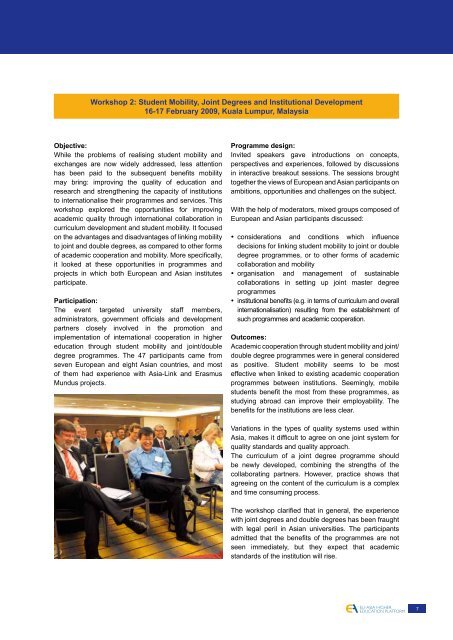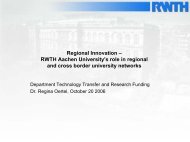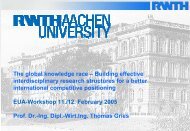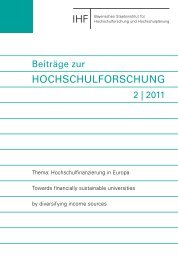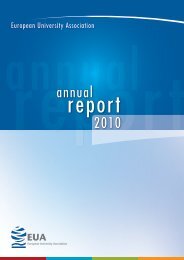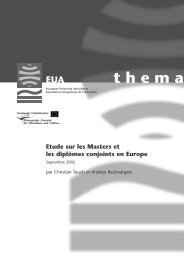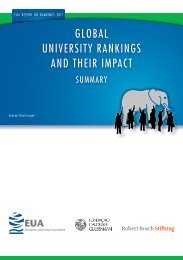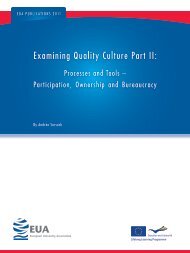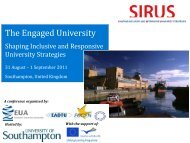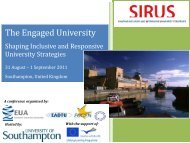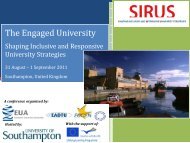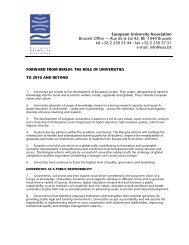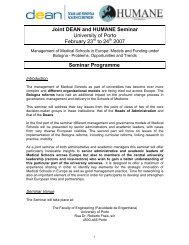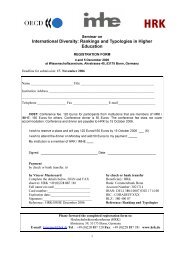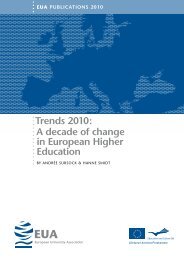The EU-Asia Higher Education Platform Executive summary of ...
The EU-Asia Higher Education Platform Executive summary of ...
The EU-Asia Higher Education Platform Executive summary of ...
You also want an ePaper? Increase the reach of your titles
YUMPU automatically turns print PDFs into web optimized ePapers that Google loves.
Workshop 2: Student Mobility, Joint Degrees and Institutional Development<br />
16-17 February 2009, Kuala Lumpur, Malaysia<br />
Objective:<br />
While the problems <strong>of</strong> realising student mobility and<br />
exchanges are now widely addressed, less attention<br />
has been paid to the subsequent benefits mobility<br />
may bring: improving the quality <strong>of</strong> education and<br />
research and strengthening the capacity <strong>of</strong> institutions<br />
to internationalise their programmes and services This<br />
workshop explored the opportunities for improving<br />
academic quality through international collaboration in<br />
curriculum development and student mobility It focused<br />
on the advantages and disadvantages <strong>of</strong> linking mobility<br />
to joint and double degrees, as compared to other forms<br />
<strong>of</strong> academic cooperation and mobility More specifically,<br />
it looked at these opportunities in programmes and<br />
projects in which both European and <strong>Asia</strong>n institutes<br />
participate<br />
Participation:<br />
<strong>The</strong> event targeted university staff members,<br />
administrators, government <strong>of</strong>ficials and development<br />
partners closely involved in the promotion and<br />
implementation <strong>of</strong> international cooperation in higher<br />
education through student mobility and joint/double<br />
degree programmes <strong>The</strong> 47 participants came from<br />
seven European and eight <strong>Asia</strong>n countries, and most<br />
<strong>of</strong> them had experience with <strong>Asia</strong>-Link and Erasmus<br />
Mundus projects<br />
Programme design:<br />
Invited speakers gave introductions on concepts,<br />
perspectives and experiences, followed by discussions<br />
in interactive breakout sessions <strong>The</strong> sessions brought<br />
together the views <strong>of</strong> European and <strong>Asia</strong>n participants on<br />
ambitions, opportunities and challenges on the subject<br />
With the help <strong>of</strong> moderators, mixed groups composed <strong>of</strong><br />
European and <strong>Asia</strong>n participants discussed:<br />
• considerations and conditions which influence<br />
decisions for linking student mobility to joint or double<br />
degree programmes, or to other forms <strong>of</strong> academic<br />
collaboration and mobility<br />
• organisation and management <strong>of</strong> sustainable<br />
collaborations in setting up joint master degree<br />
programmes<br />
• institutional benefits (e g in terms <strong>of</strong> curriculum and overall<br />
internationalisation) resulting from the establishment <strong>of</strong><br />
such programmes and academic cooperation<br />
Outcomes:<br />
Academic cooperation through student mobility and joint/<br />
double degree programmes were in general considered<br />
as positive Student mobility seems to be most<br />
effective when linked to existing academic cooperation<br />
programmes between institutions Seemingly, mobile<br />
students benefit the most from these programmes, as<br />
studying abroad can improve their employability <strong>The</strong><br />
benefits for the institutions are less clear<br />
Variations in the types <strong>of</strong> quality systems used within<br />
<strong>Asia</strong>, makes it difficult to agree on one joint system for<br />
quality standards and quality approach<br />
<strong>The</strong> curriculum <strong>of</strong> a joint degree programme should<br />
be newly developed, combining the strengths <strong>of</strong> the<br />
collaborating partners However, practice shows that<br />
agreeing on the content <strong>of</strong> the curriculum is a complex<br />
and time consuming process<br />
<strong>The</strong> workshop clarified that in general, the experience<br />
with joint degrees and double degrees has been fraught<br />
with legal peril in <strong>Asia</strong>n universities <strong>The</strong> participants<br />
admitted that the benefits <strong>of</strong> the programmes are not<br />
seen immediately, but they expect that academic<br />
standards <strong>of</strong> the institution will rise<br />
7


